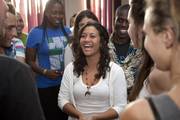After two weeks of training on the theology and politics of ecological justice in Durban, South Africa, Christian youth from around the world have pledged to start, in their own contexts, initiatives that promote the new understandings they have acquired.
Youth for Eco-Justice, a joint project of the Lutheran World Federation (LWF) and the World Council of Churches (WCC) brought together 30 young people for biblical reflection and dialogue on the environment from 28 November to 10 December.
These young people were trained in advocacy, campaign strategizing, communication and eco-justice project planning and implementation.
 Youth for Eco-Justice included Anglicans, Lutherans, Methodists, Orthodox, Presbyterians and Roman Catholics. They gathered in Durban at the same time as negotiations were underway at the 17th Conference of the Parties (COP17) to the United Nations Framework Convention on Climate Change.
Youth for Eco-Justice included Anglicans, Lutherans, Methodists, Orthodox, Presbyterians and Roman Catholics. They gathered in Durban at the same time as negotiations were underway at the 17th Conference of the Parties (COP17) to the United Nations Framework Convention on Climate Change.As they prepared to leave Durban, the youth outlined some of their future plans.
“I intend to use the 40-day Lent period to urge Lutherans in Sweden to minimize their use of vehicles and products that increase carbon emissions,” said Joakim Book Jonsson, 20.
He has opted to use the Christian understanding of Lent, a period of self-denial and prayer, to call upon all Christians to do God’s will and make God’s reign first in their hearts by reducing carbon emissions.
“Fasting for carbon emission,” he noted, would be an appropriate way for Christians to spend the Lent period. He will involve youth through social media and share stories on a blog.
Supporting Minorities
Viktor Liszka, 30, from the Lutheran Church in Hungary, indicated that he will continue work promoting the artistic endeavors of youth from the Roma communities.
Youth with artistic skills paint houses and promote the rich culture among Roma people, said Liszka. He explained the intention of Lutheran youth to promote the community’s touristic heritage and to improve their livelihood. The Roma in Hungary are the largest ethnic minority group comprising nearly two percent of the country’s estimated population of 10 million.
The Hungarian Lutheran church shows support to the minority group in difficult times. “We share Christ’s love with the [Roma] and offer food and medicine in time of disasters,” said Liszka.
Preparing for Rio+20
On her return home, Raimy Esperanza, 24, of the Presbyterian Church of Venezuela, plans actively to engage the youth in her home country to talk more about environmental concerns ahead of the Rio+20 meeting to be held in Brazil in June 2012.
Claire Barrett-Lennard, a Youth for Eco-Justice participant from the Anglican Church of Australia, intends to urge schools to work for water justice in the Philippines.
In 2008, the Lutheran Church in Korea adopted a strategic plan seeking to enhance the involvement of women and youth at multiple levels of the church. “We seek to reconcile human beings and nature to transform church and society,” said Youth for Eco-Justice participant Eun-Hae Kwon, LWF vice-president for the Asian region and a member of the LWF Meeting of Officers.
Hope for Dalits
Jeyathilaka Prathaban of the Church of South India said his church will continue to use eco-theology to give hope to the Dalit community in India.
“The caste system restrains Dalits from freely walking, fetching water or breeding livestock,” added Prathaban. He said he regrets the abuse that Dalits face in being denied the land they need to produce their own food.
Through the Eco-Dalit Forum, a youth group he intends to form on returning home, “We will reclaim land from upper castes and claim rights for water.” They will also set up village resource centres to research improved agricultural practices and help save the environment from degradation.
Such initiatives at the grassroots level are key to transforming the ecological and wider injustice people face daily, stated Rev. Roger Schmidt, secretary for LWF Youth.
“The outcome of COP17 in Durban was disappointing and falls short of what the planet and humanity need,” he commented. “But the young people participating in Youth for Eco-Justice and their churches provide a glimpse of hope.”
With these projects, the churches contribute to building consensus globally on an ethical obligation to take concrete action on ecological challenges, he added.
The WCC work on eco-justice is implemented through the Ecumenical Water Network, the Climate Justice project and the Poverty, Wealth and Ecology project.
